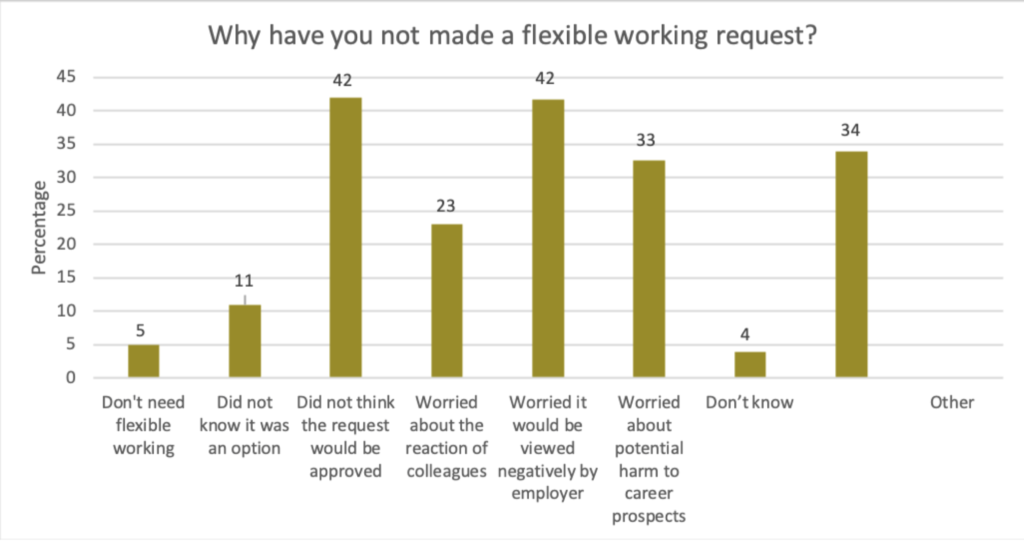Half of working mums don’t get the flexibility they request at work, according to a new survey published by the TUC and campaigner Mother Pukka.
Around 50% of 13,000 mums, working across the UK’s public and private sectors, told the TUC that their current employer had rejected or only accepted part of their flexible working request. Additionally, a whopping 86% of mums working flexibly have faced discrimination and disadvantage at work as a result. So the UK’s trade body is calling for the legal right to flexible work to be advertised with every job, as the government consults on new rights.
BROKEN SYSTEM
The legal ‘right to request’ flexible working has been in place for around 20 years. But this latest survey shows the current system is broken. Too many workers have their requests turned down; and those who get flexible working face discrimination and disadvantage as a result.
The survey also found out-dated attitudes to flexible work still exist and need to change. Many women said that they are put off from asking for flexible working. Around 42% said they were worried about their employers’ negative reaction; and another 42% thought there was no point asking as it would just be turned down. Only one in 20 (5%) working mums who hadn’t made a flexible working request said it was because they didn’t need it; (as illustrated in the chart below).
More worryingly, a whopping 86% of women working flexibly said that they have faced discrimination and disadvantage at work due to their flexible work arrangements. And 42% of mums said that they would not feel comfortable asking about flexible working in a job interview because they thought they would be discriminated against.
Flexible working isn’t just home working, it also includes options like job sharing; agreed predictable hours; term-time working, flexitime and condensed hours. The TUC believes that some form of flexible working would be suitable for every job; and there are no jobs where all forms of flexible working should be ruled out.

OVERWHELMING SUPPORT FOR FLEXIBILITY
According to the TUC, support for flexible work being the default or normal way of working is “overwhelming”. More than nine out of 10 (92%) of working mums who currently work flexibly said they would find it difficult or impossible to do their job without it.
Furthermore, another 99% of working mums want the government to make employers advertise flexible working in job ads; with the successful candidate having the right to take up this flexibility from their first day at work. In fact, 99% of women said they would be more likely to apply for a job if it included the specific types of flexible working options in the advert. Another 96% said the government should give all workers the right to flexible working from day one in the job.
MAKING FLEXIBLE WORKING THE NORM
“There is overwhelming support for mums and all working parents to be able to work flexibly to manage their work and caring commitments,” commented TUC’s General Secretary Frances O’Grady. “It’s time to make flexible working the norm as we emerge from the pandemic. It’s the best way to keep women in work and to close the gender pay gap.”
However she believes “the current system is broken”. “Employers still have free rein to turn down requests for flexible working. And women are too scared to ask for flexible working at job interviews, for fear of being discriminated against,” O’Grady highlighted. “Ministers need to do more than just tinker with a flawed system. They need to change the law so that all jobs are advertised with flexible options clearly stated; and all workers have the legal right to work flexibly from their first day in a job.”

FLEXIBLE WORKING MOVEMENT
In fact, Mother Pukka’s Founder Anna Whitehouse started the Flex Appeal movement after her flexible working request was denied in 2015. “I asked to arrive 15 minutes earlier so I could leave 15 minutes earlier to make nursery pick-up. My request was denied for fear it might ‘open the floodgates’ to others seeking flexibility,” she recalled. “I left, I quit, I broke and I felt redundant; like the 54,000 women every year who lose their jobs for simply having a baby.
In December 2019, the Queen announced flexible working as a key focus for the Employment Bill. “Flexible working is firmly on Whitehall’s table; but in 2021, 50% of working mums are still having their requests turned down,” highlighted Whitehouse. “There is a break in the floodgates. But the legal right to flexible working must be made available from the get-go if we’re going to finally change this outdated and discriminative system for good.”
STRONGER ACTION NEEDED
Both O’Grady and Whitehouse believe stronger government action is needed. They are calling on the government to:
· Unlock the flexibility in all jobs. Employers should think upfront about the flexible working options that are available in a role; publish these in all job adverts; and give successful applicants a day one right to take it up.
· Make flexible working a genuine legal right from the first day in a job. Workers should be allowed to work flexibly from day one; unless there are exceptional circumstances that prevent it. They should have the right to appeal any rejections. And there shouldn’t be a limit on how many times you can ask for flexible working arrangements in a year.
CASE STUDY: NATIONWIDE
There are huge benefits to offering flexible work arrangements, which is why companies like Nationwide are increasingly offering it. South Yorkshire based mother-of-one Jade Blackburn, who has worked at Nationwide for seven years, is a case in point. “I first asked for flexible working back in 2016 when I was pregnant; and my manager let me move my hours around. Then when I came back from maternity leave, I asked to reduce my hours to fit around my childcare. Again, my manager was supportive,” recalled Blackburn.
However, she had to ask for more flexible working arrangements through the pandemic. “At first my husband was at home on furlough so I could keep working. But when he went back to work his company changed his shifts from nine-hour days to 12-hour days at very short notice; so I had to ask to change my hours again,” she explained. “When my daughter started school in September, Nationwide agreed I could do split shifts. That’s ideal for me as it means that whatever happens with my husband’s work pattern, I know I can drop my daughter at school and pick her up.”
FLEXIBILITY BENEFITS
In short, being allowed to work from home has been a massive help for Blackburn; especially now that Nationwide has allowed her to work at home permanently, “At times during the pandemic, we were struggling a bit financially; and had to take payment holidays from some bills and the mortgage. But being based at home means I’ve been able to increase my hours back to full-time from part-time; which has been a huge bonus financially,” she added.
“Nationwide are understanding about the need to work flexibly. Their approach is for you to go to them with two or three scenarios that would work for you; and ideally, they’ll make your first preference work. But if not then you can look at one of the other options. Flexible work is great because it means I can do the job I do, be there for my daughter and earn a full-time wage. Nationwide are happy because I cover all the core hours that they need me to; and they have the benefit of retaining an experienced member of staff.”
For a copy of the report, Denied and Discriminated Against: The Reality of Flexible Working For Working Mums, click here. A US study also found that around half of working parents felt discriminated against for focusing on their families during the global pandemic. And another recent study also revealed that 3/4 of US staff want their employers to make work permanently flexible in terms of schedule and/or location. Additionally, more than half of US working parents are considering quitting their jobs due to inflexible work arrangements and uncaring employers. Click here to read more.







































